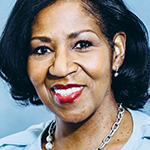While CommonSpirit Health and its predecessor organizations have been undertaking work to address health inequities and disparities for decades, the system has been organizing that work in a new way since the early days of the COVID-19 pandemic.
 Woods
Woods
Now, CommonSpirit Health is approaching health equity throughout the 140-hospital system by centering it around five priority areas, or pillars: getting its own house in order, getting the data element right, healing people with whole-person care,
partnering with others in the work, and advocating for social justice, especially when it comes to health care access.
Rosalyn Carpenter, senior vice president, chief diversity, equity, inclusion and community impact officer, said the work in this area at CommonSpirit "is about creating equity for all."
Gaye Woods, system vice president of equity and inclusion, said the effort is based on the recognition at CommonSpirit that hospitals need to pivot from how they've approached this work in the past. Focusing on "health equity can be such a driver
of improvement and transformation," she said.
 Carpenter
Carpenter
This CommonSpirit work is along similar tracks to the Health Equity Roadmap that the American Hospital Association launched last year and the We Are Called initiative that CHA launched in late 2020.
Starting baseline
CommonSpirit was formed in 2019 when Catholic Health Initiatives and Dignity Health combined to form a single ministry. Just over a year later, CommonSpirit "leveraged the moment" during the pandemic's early
days when numerous voices in society were decrying the racial and ethnic disparities that the pandemic had laid bare, said Carpenter. CommonSpirit embraced that moment as the impetus to develop what would become its five-pillar approach, she said.
Much of the work has been driven by the Office of Diversity, Equity, Inclusion and Belonging that Carpenter heads. That office began by engaging numerous groups at the corporate and local levels at CommonSpirit, including leaders in strategy, communications,
population health, community health, advocacy, transformation, information technology, quality, human resources and philanthropy.
Based on input from those discussions, Carpenter, Woods and others in the diversity and inclusion office articulated a baseline understanding of where the system stood when it came to health equity. This included an assessment of gaps and opportunities.
The office also put forth a blueprint for scaling programming to address those areas.
Building momentum
Woods has been leading much of the ensuing work. An early focus has been standardizing methods of collecting patient data to incorporate best practices. Solid data can help health care facilities to more precisely
and accurately identify areas of inequity, said Woods.
She also has been supporting CommonSpirit's local ministries as they identify ways to address inequity, forge partnerships that advance health equity, and work to replicate and tailor best practices from other CommonSpirit ministries that have developed
successful practices.
Some of the momentum has come in the areas of chronic disease management for vulnerable populations, workforce diversity initiatives, community partnerships and restorative justice around the social determinants of health, said Woods. She explained
that in this case, restorative justice has to do with ameliorating inequities around vulnerable people's access to housing, transportation, education, nutrition and social services, for example.
Collaboration and kindness
Some of the high-profile work that CommonSpirit has made progress on through its health equity pillars includes:
- A 10-year, $100 million collaboration between CommonSpirit and the Morehouse School of Medicine. Their More in Common Alliance is focused on increasing the number of clinicians who are Black or from other underrepresented populations.
- The Race to Zero environmental campaign through which CommonSpirit is pushing to achieve net-zero greenhouse emissions by 2040.
- A partnership begun in 2022 between CommonSpirit and Charles R. Drew University of Medicine and Science to address the national nursing shortage and to diversify the nursing workforce. Related initiatives include faculty resources, mentorship
efforts and pipeline programs.
- The late 2022 launch of the Lloyd H. Dean Institute for Humankindness & Health Justice. This institute is focused on advancing health justice through research, diversification of the health care workforce and funding for healthier communities.
- In mid-2022, CommonSpirit was a founding member of the Partnership to Align Social Care. This partnership unites health care providers, community-based organizations, health plans, national associations and federal agencies to improve how social
care is delivered. CommonSpirit provided a grant to the partnership. Other funders are the Robert Wood Johnson Foundation, Elevance Health, Kaiser Permanente, United HealthCare, and the Archstone Foundation.
- Efforts to remove inappropriate race-based algorithms used in the early diagnosis of chronic kidney disease. Building upon work begun in some of its Arizona facilities, CommonSpirit has been trying to improve chronic kidney disease outcomes for
people of racial minorities, especially Black people. CommonSpirit physicians and others have been working with the National Kidney Foundation, the American Society of Nephrology and others to change the way race is considered when kidney
function is assessed. The previous marker included a race-based adjustment that overestimated kidney function in African Americans and led to later diagnosis, lower prioritization for transplant and poor health outcomes, for Black patients.
CommonSpirit has updated its lab testing protocols accordingly.
More information on the work is available at commonspirit.org/what-we-do/advancing-health-equity.